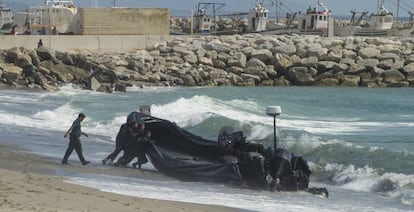The who’s who of the drug trade in southern Spain
Organized gangs in Cádiz pay out as much as €60,000 to the speedboat pilots for a load of hashish
Controlling a speedboat that’s traveling at around 110km/h while carrying up to 1,200 kilos of hashish on board is not easy. Having the courage – and the recklessness – to ride out a police chase without throwing the cargo overboard means that you are made of stern stuff. And that’s something that is handsomely rewarded.

Up to €60,000 per load is paid out to boatmen who work for the drug trafficking gangs based around Campo de Gibraltar, in the south of Spain. These kamikaze pilots are the most valued and best paid, but they are not the only people on the payroll of the Cádiz-based gangs, who pay out a minimum of €1,000 to their “employees.”
“They work in a network that’s perfectly hierarchical,” explains Miguel Gil, the head of the Algeciras customs surveillance unit. Francisco Mena, the coordinator of the Nexos federation of counter-narcotics associations, describes these gangs as being like “a commercial company that is able to create jobs and a ‘narco-economy’.” And in these corporations of crime, the fieldwork always begins in the sea.
In these corporations of crime, the fieldwork always begins in the sea
Together with the sought-after boatmen, two or three crew members are also usually on board. “They take care of the gasoline, of watching over the millions of euros of merchandise that they are carrying, and using radar and sonar,” explains José Encinas, a Civil Guard officer. For their trouble they can expect to be paid between €3,000 and €5,000, according to Mena.
On land, meanwhile, the network is even bigger. On the lowest rung are the lookouts, who are paid €1,000 a day just for warning if there are any police around. “Proving that they are involved in a drug haul is very complicated,” Encinas explains, given that their involvement is minor. Then come the longshoremen, who are paid up to €3,000 for “unloading the hashish once it arrives on the coast,” Encinas explains. They have little more than two minutes to get the drugs off the boat and load it onto the all-terrain vehicles that are waiting for them.
The longshoremen are paid up to €3,000 for unloading the hashish once it arrives on the coast
That’s when the drivers come in. Up to three vehicles are usually used for each load: one to clear the route, one to carry the drugs and a third that is there to ram police cars if need be. “They drive incredibly dangerously,” explains Encinas. “Almost without any respect for human life.”
Pocketing around €6,000 per trip, the drivers head for the warehouses or properties where the drugs are stashed before the packages begin their journey to the rest of Europe. The guards in charge of protecting these locations “are paid differing amounts, according to the amount of drugs they are taking care of and how long for,” Mena explains.
The drug money stays in the local economy, and creates a tolerance for the business in part of society
Some of the heads of these gangs are well known, such as Iván Odero, nicknamed “El Niño,” or Abdellah, known as “El Messi.” Some have been arrested while others are still being sought by the authorities. They usually work as “subcontracted employees for Moroccans, who rely on them to move the drugs,” explains Gil. Between all of them, they share out the spoils in a business where a kilo of hashish is worth between €1,400 and €2,000.
That money stays in the local economy, and creates a tolerance for the business in part of society. “In an area that has been punished by unemployment, as this one has [there is a 30% jobless rate in La Línea de la Concepción], [the drug trade] actually keeps the legal economy moving,” explains Mena. “That’s the most perverse part of drug trafficking.”
English version by Simon Hunter.
Tu suscripción se está usando en otro dispositivo
¿Quieres añadir otro usuario a tu suscripción?
Si continúas leyendo en este dispositivo, no se podrá leer en el otro.
FlechaTu suscripción se está usando en otro dispositivo y solo puedes acceder a EL PAÍS desde un dispositivo a la vez.
Si quieres compartir tu cuenta, cambia tu suscripción a la modalidad Premium, así podrás añadir otro usuario. Cada uno accederá con su propia cuenta de email, lo que os permitirá personalizar vuestra experiencia en EL PAÍS.
¿Tienes una suscripción de empresa? Accede aquí para contratar más cuentas.
En el caso de no saber quién está usando tu cuenta, te recomendamos cambiar tu contraseña aquí.
Si decides continuar compartiendo tu cuenta, este mensaje se mostrará en tu dispositivo y en el de la otra persona que está usando tu cuenta de forma indefinida, afectando a tu experiencia de lectura. Puedes consultar aquí los términos y condiciones de la suscripción digital.









































